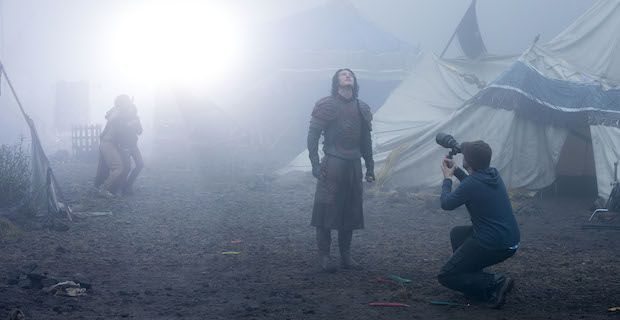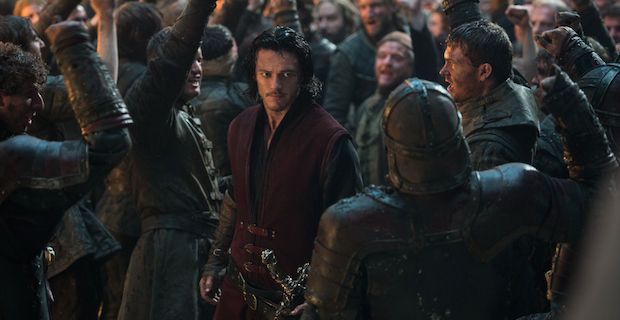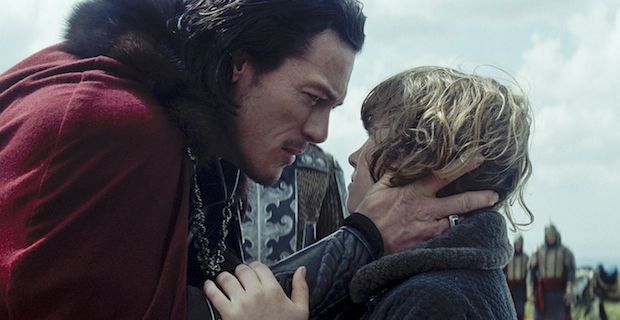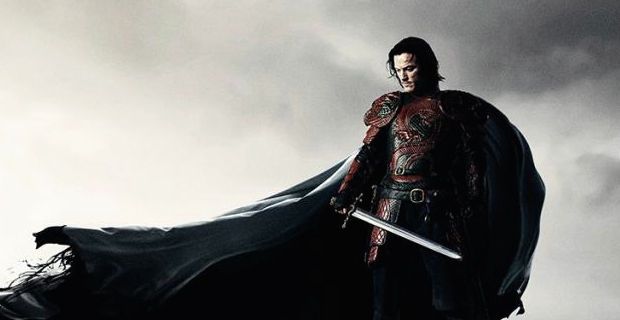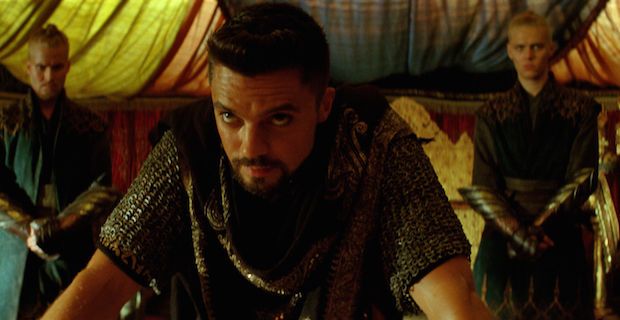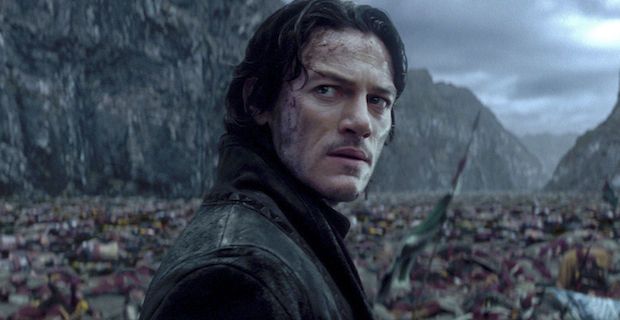When it was first announced that Universal Pictures intended to reboot some of their iconic movie monsters for a new generation of big screen movies (including the Mummy), a lot of cinephiles rolled their eyes. After all, Hollywood has been in remake and reboot overdrive the last few years - even relaunching established brands (the aforementioned Mummy, as well as Superman and Spider-Man, to name a few) within a decade of prior franchise installments. Still, Dracula stories predate Hollywood adaptation, and have spawned stories as well as interpretations across multiple mediums. While the character's origins have been touched on before, Dracula mythology is rich with opportunities for further exploration - especially for those willing to dig below the caped caricature to the man behind the myth.
While some viewers may remain skeptical of Dracula Untold, the film's director, Gary Shore, along with producers Michael De Luca, Thomas Tull, and Alissa Phillips, are well-aware of the hurdles they'll need to overcome - if they want this Dracula to wow and move modern filmgoers. In an effort to rebrand Dracula, the filmmakers are going back to the bloodsucker's roots - before he was a vampire - to tell the origins of Vlad III Țepeș, a kind-hearted king with a dark (Impaler) past that will stop at nothing to protect his wife, son, and kingdom. Instead of a film that simply explains how Dracula acquired his fangs, Dracula Untold aspires to explain why the man ever chose to embrace the supernatural in the first place.
Back in November 2013, we visited the set of Dracula Untold in Belfast, Ireland to find out what Universal Pictures and Shore have planned for Dracula's origin story. During our time on set, we had a chance to speak with executive producer Alissa Phillips about Dracula Untold (formerly Dracula Year Zero) - specifically what made the studio choose this particular script for their origin story, how the film fits into actual historical record, as well as discuss comparisons to The Lord of the Rings series.
We've already posted our full set visit report and will be publishing further interviews in the coming days but, in the meantime, check out the trailer for Dracula Untold followed by our interview with Alissa Phillips below.
Alissa Phillips, Producer
Alissa Phillips: This is the origins tale, which we believe has not been done before, of Vlad the third by historical record. Sometimes it is Vlad Tepes, which means Impaler, so sometimes people know him as Vlad the Impaler. The original writers Matt Sazama and Burk Sharpless, this is an original screenplay; six years ago I read it. Michael De Luca and I are simultaneously prepping “Fifty Shades of Grey” – a little movie that people talk about. This was their own idea Matt and Burke thought, we know Bram Stoker in the 1890s wrote this wonderful Victorian, England, Gothic story of Dracula which he of course, Bram Stoker, based on Vlad Tepes of historical record. So the violence that was associated with him in the 1400s that certainly carried into the 1800s and Bram wrote this wonderful fictional tale of Dracula.
Now the writers Matt and Burke six years ago decided, how did he become that? How did he get to Dracula in the 1800s? So it was their idea to do an origins tale, very much in the vein of the films we see now. This was their idea, they are brand new writers, they weren’t inspired by anything else, they just wondered how he became Dracula. So they went back to the reign of Vlad III and that’s where our story starts in the 1400s. When you meet Vlad he’s a good king, he’s a good ruler, he’s married to a wonderful woman, Merina, played by Sarah Gadon, he has a loving son, Ingeras, played by Art Parkinson, his land is at peace - it’s what we call Transylvania in the film, it was Wallachia then, modern day Romania. His land is at peace but that peace, as we learn in Act I as it unfolds, is a tenuous peace. Basically he’s been able to keep his land and his people safe by paying tribute to the Ottomans and Turks, Sultan Mehmed II, and our film is all based on history. The writers did tons and tons of research and in many ways and in many places it lines up with what we believe was the case. Sometimes in incredibly specific ways.
So what’s happening in our script is you meet them, they’re happy, he’s a good king, he does have a dark past that you realize is there. The backstory of Vlad is that he had been raised in the court of Sultan Mehmed I, the father of the character played by Dominic Cooper in our film, Mehmed II. He had been taken as a real hostage, raised in this court, raised very violently, trained to kill, this is Vlad. When we meet him, Luke Evans, is thirty and he’s trying to hide that past. He doesn’t want to be that violent person anymore. He has no desire to be that guy. He wants to be the good king that you meet. But Mehmed II comes calling asking for tribute to keep the peace but he also comes calling for something else, which is the inciting incident that drives our film. He comes to the court in the scenes prior basically saying, “I know you guys pay us tribute and we’re sieging all of Europe, I also need boys to help out soldiers, and I need a thousand of them.” He needs what is called Janissaries which is exactly what Vlad was raised as, very trained fighters.
Vlad doesn’t want to give up his people’s sons and as the story progresses Mehmed also increases the ask for Vlad’s own son - as a part of that thousand and that really is what drives our film, this father-son dynamic. Not wanting to give up his people, wanting to maintain the peace but being forced to do things that are very, very drastic to save his people and is really the impotence of what Matt and Burk set up, really try to motivate how he became Dracula. How did he end up there? He ended up there because he was forced to because the Turks and the Ottomans were sieging his small land asking for his other sons and he had to go great and extraordinary lengths to try to protect his people. That’s basically the overview of the film.
What you’re seeing right now, in this scene, he is returning from saying no to Mehmed and said I’m not giving you a thousand boys; I’m also not giving you my own son. He slain some of the emissaries that asked for it because the story is about fate and even though Vlad has tried very hard to deny his impaling past, people ask me a lot is this movie about impaling—no. Impalings happened before the film started. He was an impaler in the Turkish court before he’s king, that’s the violence he’s tried to deny. Even though he’s tried so hard to not go to that violent place he’s been forced to. So he’s actually slaying a bunch of Turks because they came calling and he did slay them. He’s now gone up and gotten the power that he seeks which is vampirism and that’s part of the story. He’s actually coming back to the castle I don’t know which part you’ll be here to watch you’re going to see him enter the doors and he’s returning; he’s going to be a little disheveled cause he’s been through quite a lot. The castle is under siege because the Turks are so mad that Vlad denied their request that Mehmed had said go attack them. The Turks have no chance.
I was actually reading a historical record [and was surprised] that Matt and Burke even got right. I think that at the time this all happened Vlad had in the neighborhood of 40,000 troops total and Mehmed had a couple hundred thousand. So it would have been a slaughter and a rout, that’s what you’re seeing, that’s why it’s all damaged in the scene. They’re just lobbing canons at the castle and it’s just falling. They’re all going to die but unbeknownst to all his people as he enters, he’s come back with extraordinary powers. He will motivate them and inspire them and they will, in a scene that we will not be shooting today, charge out and actually fight back.
Is this a second act turning point or is this just before the third act?
Alissa Phillips: Way before the third act but good question. This is right between the second act. He’s gone ahead and drunk the blood, of our character Caligula, which is at the end of the first act and he is now returning. In movie terms, he’s on a rise and he’s going to win the battle and these guys are going to have no idea how. Like Dimitru and the other characters that you see will wonder, “How did we win that battle?” It’s part of some trickery that we’re going to do in the battle sequence that we’re shooting later. They’re going to be like, “wow somehow we managed to fight a lot of Turks and win.” They’re not gonna win the war, there are more battles to come, cause the history of Mehmed II and Vlad III and this is historical record, they were raised together in the court of Mehmed I, so they were actually raised as brothers – so to speak and that’s very much a theme of our film that these two, Mehmed has a lot of pent up anger because Vlad was a better fighter as a child. That maybe his father may have loved Vlad more even though he was not his son. So once Vlad has said no to Mehmed II, he’s going to keep coming. He’s not going to lose so that’s part of what the rest of the movie plays out, his troops will lose the battle that follows this, they’re not going to lose the war at least not until Dracula/Vlad has to sacrifice everything.
What made you decide to go with a relative unknown as far as your director of this film?
Alissa Phillips: It’s not that unusual, the only way to get older directors is to start with younger ones. I had seen his short, “A Cup of Tears” which is online if anyone has seen it’s incredibly stylized and there’s such an aesthetic and a vision there and I wanted to meet him. When I met him, he read the script and the first thing he said was, “it’s a father-son story” and for us that was exactly what we wanted to hear - because he went right for character. There’s a lot in this script, there’s a lot of spectacle, there’s visual effects, there’s tons of cool stuff and a lot of directors would have been like, “Oh my God, I can’t wait to shoot the hand of bats” or things like that but he smartly went right for what makes a film great - which is the character. Everything else stands around great character and truly at multiple levels the themes of this film are father-son, tragedy, love, romance, fate and all these broader themes. The second thing he said to us was, “If you want to do a bloody, gory, vampire film, I don’t want to do that.” That was also what we wanted to hear, we felt like there was a cannon of fabulous films that area all vampiric and Dracula. We weren’t trying to do that, we’re trying to do a hero’s story. We’re trying to do something different, we were trying to let our audience in on the choices that Vlad made, so that we feel sympathy for him. Sometimes we talked about William Wallace in Braveheart and the other side of that dilemma – that make people feel very different about William Wallace. We wanted to say how did he arrive at where he is? And Gary so got that and we didn’t want to make an R rated gory horror film. We say a lot this isn’t your father or your grandfather’s Dracula. It’s going to be very different.
So this film is not rated R?
Alissa Phillips: It’s not rated R, I mean I hope not, we’re not shooting it R [Rated]. I think you’ll find that it’s an epic, sweeping, action, fantasy film. It’s much more in the land of The Lord of The Rings tonally. I intend to bring my children to it, which is obviously biased but I also brought them to Lord of The Rings. We want kids to enjoy this and we feel like there is plenty of blood and vampires out there - you can turn on True Blood any night. Although blood is an omnipresent, iconic, story point of vampirism, we can’t deny that, but gore doesn’t have to be. If you want to see a film about Vlad The Impaler this is probably not it.
You talk about the character Dracula, Dracula’s arc is behind him in a sense right?
Alissa Phillips: Yes
But doesn’t he ultimately, if he’s going to be the “King of the Vampires,” he has to re-embrace that darkness and go back to it, right?
Alissa Phillips: Re-embrace it unwillingly and that’s a question of fate and consequences, so there’s a question of are we able to deny our past? Is a good question that you could ask of Vlad. If there’s something I’m very ashamed of that I did in my past and when you meet him he’s a very good king, he’s a very good father, but deep down there’s something I don’t want anyone to know about and I don’t want to go there again, the kind of question of fate was it inevitable? Was it inevitable that once you’ve been that way you can’t escape it. Now that ties very thematically into Ingeras, when Mehmed II asks for Vlad’s own sons what Vlad is thinking to himself is, ‘I know exactly who I am I know exactly how I was raised. I know exactly what I hate about myself which is this violence that I was forced into as a child and trained in and I don’t want that for my son’ and any other son. So it’s very important that that violence is there, it’s part of his character, it’s true but it also very much motivates the decision not to give up his own son, so that his son would not enjoy the same fate as he did. But the tragedy of the character is that he’s forced into again.
NEXT: Will We See More Untold Stories of Dracula?
You mentioned Caligula earlier which signifies that the script hasn’t been changed all that much. I read it years ago, have you guys been tinkering with it through the years?
Alissa Phillips: I mean tinkering in a word that it’s in its best case. It has not been in development hell, it has not been heavily rewritten over the years. It is very much the same story; much of the dialogue is as scripted originally. It’s been very exciting because I’ve lived with this script for so long to hear these lines unchanged, delivered by actors. There certainly has been some rewrites, many of which were for production reasons, but the Caligula scenes with a couple of blocking changes, almost entirely as originally scripted. I’m glad you read it. That was one of the first things when Mike and I read it, I had gotten up really early and it said Dracula Year Zero, it was very early, I was up with my first kid, too early I was reading it thinking, ‘Oh God, here’s another vampire film’ then I started reading it and thought, ‘well this is interesting’ it has an interesting tone to it. It had a serious, sweeping epic tone to it. Well that’s interesting and then I got to Caligula and then I thought, ‘What is Caligula doing in this script?’ It’s the 1400s which arguably is an undercovered period of history anyway. Caligula’s reign was around 40 A.D. so I was like, ‘Well how did he get there?’ So right when I got there, I thought this is really interesting, what is this script?
Then I kept reading and that very much motivated me to say, ‘Wow this is something different’ And then I called, I can’t quite remember around 9 and I said, ‘I got something, you gotta read this.’ I failed to mention Caligula, I started talking about it and then he said, ‘Alright I’ll read it’ and then like an hour later I was going past his house and he was like, ‘Caligula is in this script!’ So his reaction and mine were exactly the same. With Caligula, the Romans were in modern day Romania, I’m told there are still Roman ruins and probably more if we uncovered them, so that’s very much of historical record that they were here in this area of our film. What the writers were using on Caligula is the sort of mystery of his death, some people think that they never found where he was buried, there’s debatable history on Caligula, so they had to start it with Caligula as an interesting character they wanted to incorporate into a script - because the mysteries surrounding his death, because of knowing he would have been at one point in this part of Europe, in what Bram Stoker called Transylvania, they started backing up the story with this, ‘What if we started with this? What if he was still in Transylvania? What if there is a reason he is still alive?’ So that’s how it came to be.
What was the impetus behind changing the title? Because it had been Dracula Year Zero for a long time.
Alissa Phillips: I don’t know, titles are very fluid. I don’t give it too much thought because at the end of the day we’re going to eventually all have a meeting about what Universal feels is the best. So I don’t know, I think at one point they thought, ‘Dracula’ was cleaner. I can’t even speak to that, I sort of wait till the end and to see where we end up and maybe where we end up, I’m assuming Dracula will always be in the title. As a producer you’re sort of like, ‘Ok, we’re still shooting.’
Are you starting to think of how to sell this so that it gets separated from YA (Young Adult) and things like that?
Alissa Phillips: I hope that what we do cinematically with the trailer and the marketing stuff sells the difference and you would see it when you watched the trailer, it’d be something… because I know what we’re shooting and it’s not gonna be anything like Twilight, and I’m a huge fan of Twilight, I’ve been to every one in the theatres. I would hope that by the time we get to marketing it, it would differentiate itself visually enough. We certainly are aware and I think Universal marketing has been doing an amazing job in making sure we position it correctly. That you understand this is an origin tale, this is a heroic tale, so making sure that people don’t have so many misconceptions that it prevents them from showing up. They don’t have to understand what we’re doing, they don’t have to know about Caligula but they have to be intrigued by the idea of a new retelling. So I hope we do it right.
Are you guys thinking of a potential franchise for it?
Alissa Phillips: I get that question every time and it’s the one that I dread the most.
Because there’s all this historical material that you’re weaving into the story.
Alissa Phillips: I know there’s a lot of years between 1400 and 1890 isn’t there? Quite a few. I can answer this more as a producer than I could if I worked for Universal but I feel as a producer and certainly I would answer for Gary we are so focused on getting this one right. If you sit around thinking what you are doing for the second film or the third when you haven’t even finished or even seen the first cut of the first, then I feel you are really dooming yourself. You got to just get the first one right. You got to do it responsibly; you have to make all the right choices; the right cast, the right budgets. You have to have the right team, which is what took us a while to get it ready, I’ve been on since the beginning, but it’s never as I said been in development hell. It’s always been about getting the right team, the right place; Northern Ireland. It takes a while for movies to get made. It’s been about six years for me, that’s normal. I believe that if we are rewarded with success, we would love the story to continue, absolutely. We would love Luke Evans to continue playing this. We just need to get the first one right.
Speaking of Luke Evans how did you end up getting a young Welshman to play and 15th century Transylvanian nobleman?
Alissa Phillips: That’s a good way to ask that question. It was easy, we knew his work a little bit from Fast 6 thru Universal, I was able to see really early takes of some of the stuff he had done. I knew him as an actor a little, he’s done plenty of work, but he immediately was interested in the role and we met him. Gary had met him a couple of times before I met him and he just understood the role completely - like Gary did. Immediately saying, “I understand this role.” He wanted to play it and from what I’d seen of him in Fast 6, it was well documented how good he was, he got really, really good reviews and his performance was amazing. I’d also known that he will have a much bigger role in The Hobbit Two and Three. I will say that people will be more aware of him through The Hobbit than they do right this minute because he has quite a big role in that - but it hasn’t come out yet. He’s just perfect and every day that he’s stepped in front of the camera, it’s been the right choice.
Is there any concern about or frustration over the fact that there’s this new Dracula TV series happening? Or do you not care at all? It doesn’t faze you?
Alissa Phillips: I get excited. I think that media drives media. I’m one of the producers of Frank Darabont’s new show, which feels like I’m plugging right now and I’m sorry, I don’t mean to. We’re doing LA Noire, now it’s called Mob City, and they were shooting Gangster Squad at the same time and I kept getting that question: aren’t you concerned about Gangster Squad because you guys are doing a TV show? So I was on the opposite side of that, aren’t you worried about Ryan Gosling? You know what we can both exist. So I had no problem and none of my team did and I think Gangster Squad succeeded in its way and was its own film but I don’t think with our show anyone is going, ‘I’m not going to watch it because of Gangster Squad’ and vise versa I hope no one chooses one over the other, I think these both exist in two different spheres and they help each other.
This is more of an industry related question; there was talk in Variety that Legendary was going to come onboard—
Alissa Phillips: Yea they did!
Oh they have cause, I didn’t really know. Cause they have certain ways with their films, has that had creatively any impact?
Alissa Phillips: It has no impact whatsoever. I believe that’s all Universal and something exciting for them. I couldn’t speak to the specifics of it but I believe that they are but we were already shooting, I think it’s exciting. I don’t know what way it would impact us but I think Legendary has an amazing brand and a veracity, so basically combined with Universal, which this is such a Universal film; it’s monster mythology and they have a history of doing these kinds of films. So we were already squarely in what you would call a Universal film - and then you only added a little more to it. It’s like Legendary makes these kinds of films too, so to us it’s great, cool.
We'll post more interviews with the cast, producer, and behind-the-scenes designers in the coming days.
However, if you're eager for more Dracula Untold info right now, make sure to check out our full Dracula Untold set visit report and Dracula Untold news archive - which will include the following interviews (as they are posted) along with much more.
On-Set Interviews
- Luke Evans - Vlad III Țepeș
- Alissa Phillips - Producer (You Are Here)
- Dominic Cooper - Mehmed II
- Sarah Gadon - Mirena
- Francois Audouy - Production Designer
- Ngila Dickson - Costume Designer
MORE: Dracula Untold Trailer & Poster
Dracula Untold opens in U.S. theaters on October 17th, 2014.
Follow me on Twitter @benkendrick for further updates on the Dracula Untold, as well as movie, TV, and gaming news.

